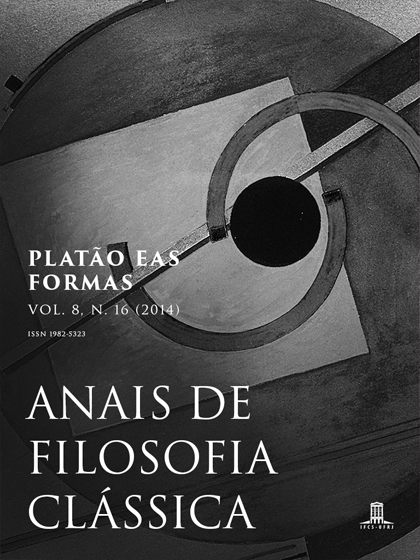A brincadeira de Eutidemo e Dionisodoro no Eutidemo de Platão
DOI:
https://doi.org/10.47661/afcl.v8i16.3132Palavras-chave:
Platão, Eutidemo, formas de discurso, conhecimento, formasResumo
Duas vezes no decorrer do Eutidemo (277d, 288b), Sócrates diz que Eutidemo e Dionisodoro não estão discutindo a sério, mas sim a brincar com eles. Em ambas as passagens a distinção entre o "discutir a sério" e "estar a brincar" introduz a explicação socrática sobre o que seria de fato o conhecimento a ser buscado. Sócrates (o personagem) parece apontar nessa distinção entre brincadeira e seriedade a importância da forma do discurso para a descoberta das formas platônicas. Pretendo trabalhar nesta apresentação a relação entre a forma do discurso (erística, elenchos) e a descoberta das formas (ideias).Downloads
Referências
ARISTÓFANES. Clouds. Disponível em: http://data.perseus.org/citations/urn:cts: greekLit:tlg0019.tlg003.perseus-grc1:1
DIMAS, P. Happiness in the Euthydemus. Phronesis, vol. 47, issue 1, p. 1-27, 2002.
IRWIN, T. Socrates: From Happiness to Virtue. In: ______.Plato's Ethics. New York: Oxford University Press, 1995. p. 52-64.
KERFERD, G.B. Dialectic, antilogic and eristic. In: ______. The sophistic movement. Cambridge: Cambridge University Press, 1981. p. 59-67.
LINFORTH, I.M. The corybantic rites in Plato. University of California Publications in Classical Philology, volume XIII, 1946, p. 121-162.
PLATÃO. Eutidemo. Tradução, apresentação e notas: Maura Iglésias. Rio de Janeiro: PUC-Rio/Loyola, 2011.
PLATÃO. Eutidemo. Tradução, introdução e notas: Adriana Manuela de M. F. Nogueira. Lisboa: Imprensa Nacional-Casa da Moeda, 1999.
RIDER, B.A. Socrates' philosophical protreptic in Euthydemus 278c-282d. Archiv für Geschichte der Philosophie, 94.2, July 2012. Disponível em: http://dx.doi.
org.ez39.periodicos.capes.gov.br/10.1515/agph-2012-0009 Acesso em: 03 Dez. 2012.
SPRAGUE, R. K. Plato's use of fallacy. A study of Euthydemus and some other dialogues. New York: Barnes & Noble, 1962.
STRAUSS, L. On the Euthydemus. Interpretation 1, p. 1-20, 1970.
VLASTOS, G. Happiness and virtue in Socrates' moral theory. In:______. Socrates. Ironist and moral philosopher. New York: Cambridge, 1991. p. 200-232.
WOLF, U. Die Unbestimmbarkeit der eudaimonia. In:______. Die Suche nach dem guten Leben. Platons Frühdialoge. Hamburg: Rowohlt, 1996. p. 67-93.


